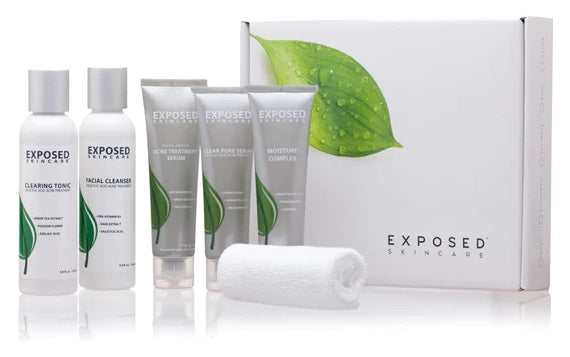Numerous beauty blogs and skincare gurus advocate using rice water for acne. However, it's essential to weigh the pros and cons before you begin soaking rice in water and applying it to your troubled skin.
This article sheds light on the less-discussed side of using rice water for acne, giving you reasons to consider alternative care products.
Also read: How to choose the best acne treatment
Biggest Take-Aways:
- Rice water has mild skin benefits but is not a targeted treatment for acne.
- The use of rice water in traditional skin care routines like in Korea and Japan is often part of a broader approach and not a standalone treatment.
- While rice water may offer some soothing and potential lightening benefits, these are not scientifically proven effective for acne treatment.
- Exposed Skin Care offers a well-researched, focused approach to acne treatment, making it a more reliable alternative to rice water.
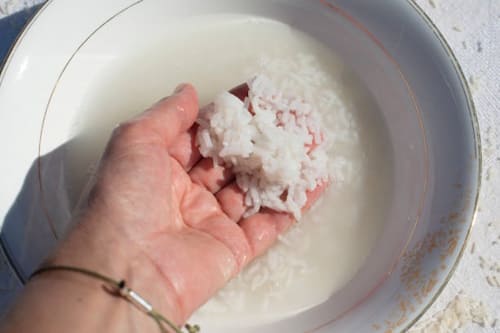
Reason 1: The Ambiguity of Skin Benefits
When it comes to rice water for acne, the science is less than conclusive. While some studies suggest that rice water contains amino acids and minerals beneficial for skin and hair, most are inconclusive.
What Science Says?
There is minimal scientific evidence to prove that rice water is an effective acne treatment. Even the skin benefits of rice water are often overstated. Most studies center on its effects on skin aging or dry skin rather than its impact on acne. This leaves users in a quandary, wondering if it's worth the hype.
The Internet Hype vs Reality
The internet is awash with personal testimonials and DIY recipes claiming rice water is good for the skin, especially for acne treatment.
But what works for one person's skin condition may not work for another, given the different skin types and issues people face. Before beginning any skin regimen with rice water, consider that results can vary widely.
Reason 2: Risk of Skin Irritation
Applying rice water on your face might not always produce the soothing effects you expect. Instead, some users report experiencing skin irritation, particularly when using fermented rice water.
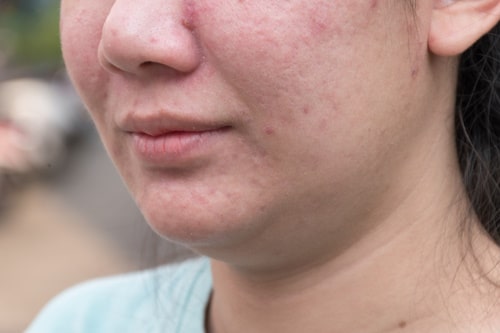
Not For Everyone
Though rice water is often considered a "one-size-fits-all" natural remedy, this is far from the case. Different skin types—dry, oily, or combination—may respond differently to rice water.
Those with sensitive skin may find that rice water exacerbates irritation and redness, contrary to its supposed calming effects.
The Fermentation Factor
Fermented rice water has been touted for its enhanced benefits over plain rice water, but it also carries an increased risk of skin irritation.
The fermentation process increases the pH levels of the water, which can irritate sensitive skin. Fermentation can also encourage bacterial growth if not properly stored, posing another risk.
Reason 3: The Question of Consistency
Rice water may seem like an easy and cheap solution, but achieving a consistent formulation at home can be tricky.
How to Make Rice Water?
While it's relatively simple to make rice water at home by soaking rice in water or boiling rice and water together, the resulting solution can vary greatly. Factors like the type of rice, the soaking time, and whether or not to dilute with plain water all affect the final product.
Fluctuating Efficacy
A small amount of rice water one day might seem perfect, but too much or too little the next day could bring vastly different results. Consistency is key in any skincare routine, and the variable nature of homemade rice water makes it a less reliable care product.
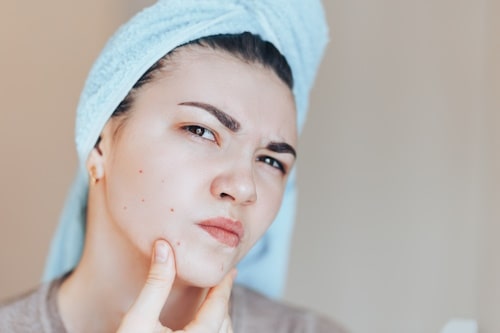
Reason 4: Contamination Concerns
While making rice water at home may seem like a simple procedure, there's a risk of contamination that could worsen skin conditions like acne.
Safe Storage
Storing your rice water in an airtight container is crucial, but even then, it has a short shelf-life. Homemade rice water can spoil quickly, especially when left at room temperature, turning it from a touted elixir into a breeding ground for bacteria.
Potential for Microbial Growth
The risk of contamination increases when using organic types of rice that haven't been treated with pesticides or herbicides. The introduction of microbes from your hands or utensils could create a solution that's more harmful than beneficial.
Reason 5: Lack of Comprehensive Studies
One of the most significant downsides to using rice water for acne is the lack of comprehensive, long-term studies to support its efficacy.
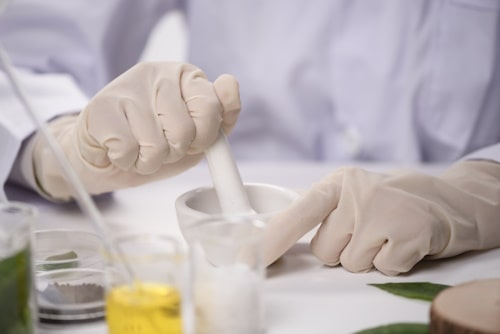
Limited Research
Despite the age-old claims that rice water is good for the skin and hair, modern science has yet to provide conclusive evidence to support this. Most research thus far has focused on other uses for rice water, such as hair care or digestive aids, rather than its impact on acne.
The Buzz in Korea and Japan
In Korea and Japan, rice water is very popular for skin and hair care. While it's tempting to believe that rice water can also help with skin problems like acne, the function of rice water may be more cosmetic than curative.
Advantages of Using Exposed Skin Care for Acne Management
If you're considering rice water for acne, you might want to explore more targeted and scientifically-backed solutions. Exposed Skin Care offers an array of skin care products specially formulated to tackle acne at its core without the inconsistencies and potential side effects of rice water.
Here are the benefits of Exposed Skin Care:
- Targeted Acne Treatment: Unlike the ambiguous rice water benefits, Exposed Skin Care products have a focused approach to treating acne. Our Treatment Serum, for instance, is designed to reduce and prevent blemishes effectively.
- Formulated for Different Skin Types: Whether you have oily skin or dry skin, Exposed Skin Care has a product for you. This contrasts the one-size-fits-all approach of applying rice water on your face and neck.
- Scientifically Backed: Our products contain ingredients proven to help your skin. Our ingredients work synergistically to soothe and tone your skin, protect and repair your skin, and improve skin health overall.
- Ease of Use: With Exposed Skin Care, there's no need for complex ways to prepare rice water, sieve the rice, or worry about storage. Just apply our products as directed, and you're good to go.
- Bonus Products: Our kits include products like Moisture Complex for dry skin and Clarifying Charcoal Mask, which can serve as an effective face mask. These are more specialized than applying rice water twice daily and expecting diverse results.
By choosing Exposed Skin Care, you opt for a dedicated and proven solution, bypassing the potential pitfalls of using rice water for acne management.
Conclusion
The debate about using rice water for acne management tends to overshadow more effective and scientifically proven options. While using rice water—applied with a cotton ball or pad—might seem like a soothing and easy approach to skincare, it comes with various uncertainties.
You may find recommendations to apply rice water twice a day, but it's essential to ask whether this regimen truly helps skin or is just a trendy suggestion with scant scientific backing.
Although rice water does contain some beneficial elements like rice starch and rice bran, which are good for the skin to some extent, these ingredients are not specially formulated to tackle the complicated nature of acne.
In countries like Korea and Japan, where rice water is traditionally used, it's often part of a more extensive skin and hair care routine rather than a standalone miracle cure for blemishes and acne.
Additionally, while some sources claim that rice water can be applied to lighten the skin or even brighten blemishes, these effects are not universally proven. Even if you're massaging it into your skin after sieving the rice with meticulous care, the results may be far from what you're hoping for.
Maintaining water at room temperature, ensuring it's rich in desired properties, and using it consistently can be cumbersome. Compared to the inconsistencies and effort involved in rice water use, Exposed Skin Care offers a well-researched, easy-to-use alternative that targets various skin types and issues.
With Exposed Skin Care, you won't have to guess the efficacy of the products second, as their ingredients are proven to not only soothe the skin but also provide targeted acne treatment.
FAQs
Is rice water good for treating acne?
While rice water has some mild benefits for the skin, it's not specially formulated to treat acne effectively.
How often should you apply rice water on your face?
Some recommend applying rice water twice a day, but its efficacy in treating acne consistently is not scientifically proven.
Can rice water lighten skin?
Claims about the ability of rice water to lighten skin are not universally proven.
Is rice water popular in other countries for skin care?
Yes, in countries like Korea and Japan, rice water is traditionally used as part of a broader skin and hair care routine.
How does Exposed Skin Care compare to rice water for acne treatment?
Exposed Skin Care offers a scientifically-backed, targeted approach to treating acne across various skin types, providing a more reliable solution compared to the ambiguous benefits of rice water.










